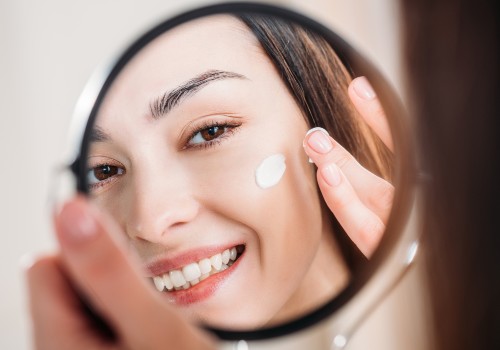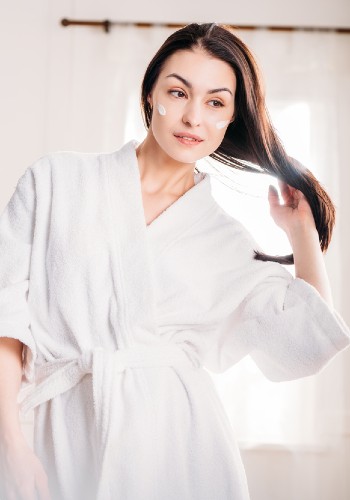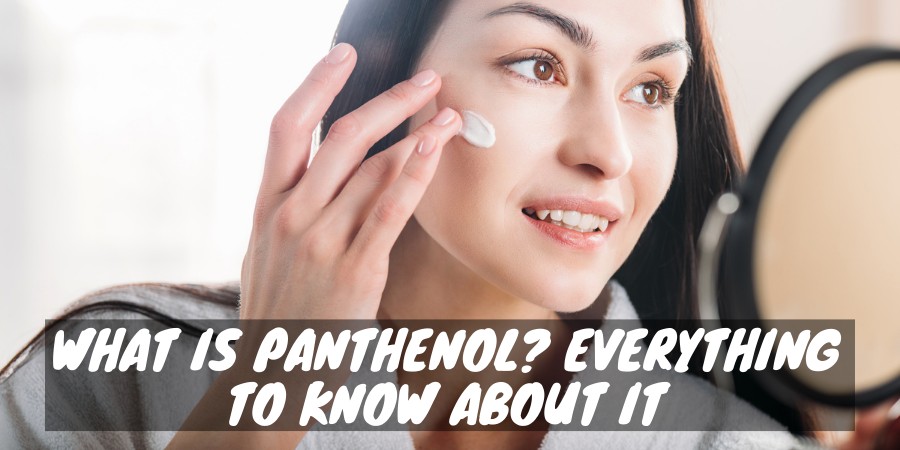You’ve heard of hyaluronic acid. You know all about glycerin and ceramides.
But your moisturizer know-how isn’t complete without panthenol.
It may not be as famous as other hydrating ingredients, but panthenol definitely deserves a place in your skincare routine. Let’s find out why.
What Is Panthenol?
Panthenol is another term for provitamin B5.
A provitamin is a precursor to a vitamin — in other words, a compound that your body can convert into a vitamin.
When you apply or ingest panthenol, your body converts it into vitamin B5, also known as pantothenic acid. Vitamin B5 binds easily to water, so it helps your skin retain moisture and heal from damage.
Other Names for Panthenol
Panthenol may be a component of some of the skincare products you already use. But because it goes by so many names, you might not even know it’s there.
Other names for panthenol include butanamide, dexpanthenol, D-pantothenyl alcohol, alcohol analog of pantothenic acid and, of course, provitamin B5.
Panthenol for Skin: Effects and Benefits

Hydrating and Moisturizing
Most so-called “hydrating and moisturizing” ingredients actually only do one or the other.
Hydrating ingredients (or humectants) deliver water to your skin cells, while moisturizing ingredients create a barrier that prevents water from evaporating out of your skin.
Therefore, moisturizing ingredients (also known as emollients) won’t do much to help skin that’s already dehydrated — there isn’t enough water in your skin to begin with.
But panthenol is the rare ingredient that’s both a humectant and an emollient.
This means that it binds to water molecules and transports them directly to your cells. It then seals up the tiny cracks in your skin that allow water to evaporate, ensuring that your skin gets rehydrated and stays that way.
Fighting Inflammation and Irritation
Panthenol also has anti-inflammatory properties, which is why it’s often found in allergy, sunburn and anti-itch ointments.
And these properties go far beyond the surface of your skin.
When stress hormones are high, your body responds by swelling up, often resulting in discomfort and irritation.
But when vitamin B5 is absorbed into your body, it works to regulate your stress hormones. This in turn reduces inflammation and makes you feel more comfortable in your skin.
Applying panthenol directly to inflamed or irritated areas of your skin delivers direct relief where it’s needed most.
Promoting Wound Healing
The anti-inflammatory, rehydrating and skin barrier-reinforcing properties of panthenol make it excellent for accelerating wound healing.
In fact, it’s so effective that many tattoo artists recommend applying panthenol ointment to new tattoos to help them heal faster.
Hydrated cells are more capable of repairing themselves after damage, so panthenol’s humectant and emollient properties are indispensable for damaged skin.
Panthenol has been shown to reduce scarring and even relieve the symptoms of skin conditions like acne, eczema and rosacea.
Anti-Aging and Rejuvenating

Fine lines, wrinkles and sagging skin are all normal signs of aging, but that doesn’t mean you have to live with them.
And if you’re one of the many people who are interested in looking younger, panthenol can help.
As an emollient, panthenol smooths out the minuscule cracks, tears and gaps in your skin to lock in moisture. But it has the same effect on fine lines, especially those in their earliest stages.
Applying panthenol to your fine lines can reduce their appearance, making them blend back into the rest of your skin and creating a smooth, even look.
And thanks to its hydrating properties, panthenol literally plumps your skin up, making it look tighter and less saggy.
Bonus: Great for Hair and Nails
Panthenol’s benefits aren’t limited to the skin. It’s also fantastic for hydrating and strengthening hair and nails.
Many conditioners and other hair products contain panthenol to help hydrate and moisturize dry strands. This protects fragile or damaged hair, boosts shine, promotes softness and even slows down the process of thinning hair.
Panthenol has similar effects on nails, preventing breakage and rehydrating dry, fragile nails. It’s often found in nail-strengthening treatments and cuticle oils for this reason.
Is Panthenol Safe to Use?

Many of the most effective skincare ingredients have the unfortunate drawback of being unsafe for frequent use. Is panthenol one of them?
Thankfully, it’s not. Panthenol is considered safe for use in cosmetic products, including makeup and skincare products.
Allergic reactions to panthenol are extremely rare, and when they do occur, they usually consist of mild contact dermatitis (a rash).
Those with sensitive skin or who have had allergic reactions to other skincare ingredients should do a spot test of any products that contain panthenol to be safe. Apply a small amount to an inconspicuous area of skin and check for reactions.
Otherwise, the vast majority of people should be able to use panthenol with no side effects.

